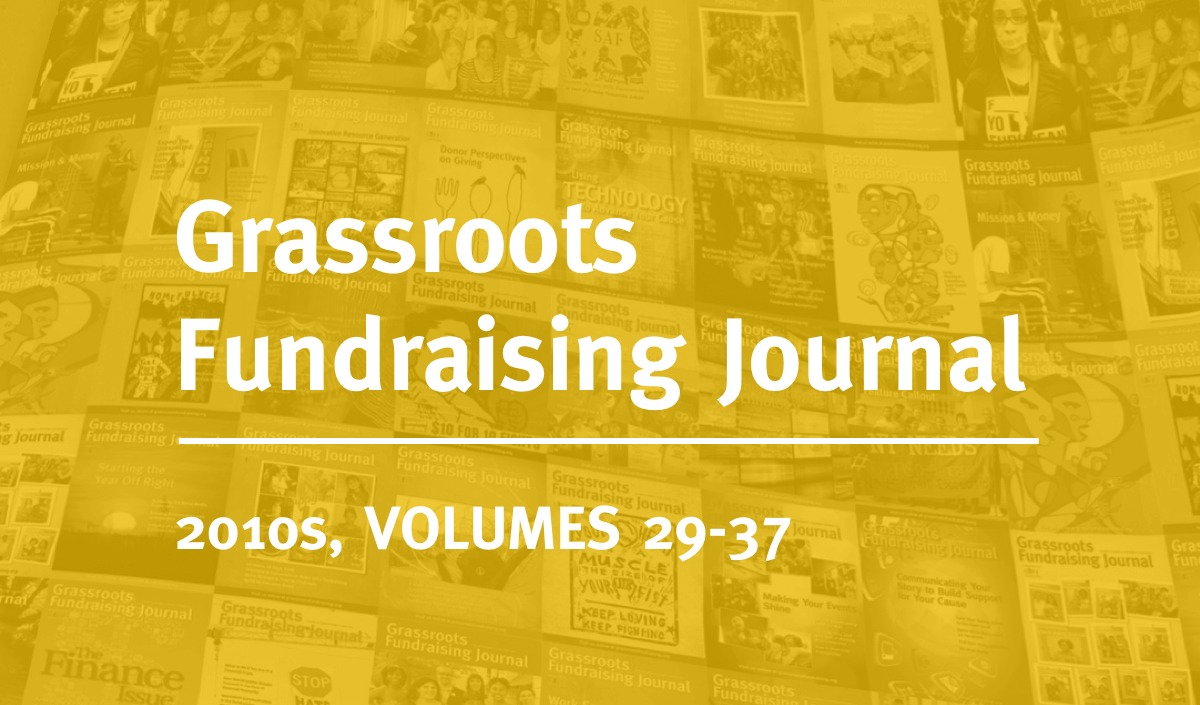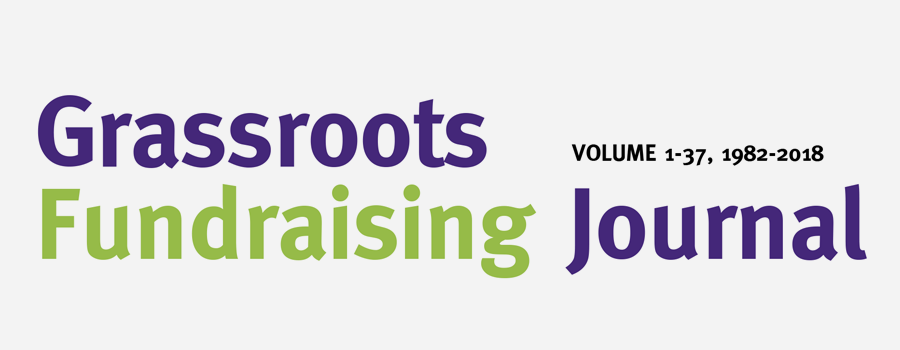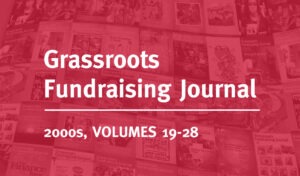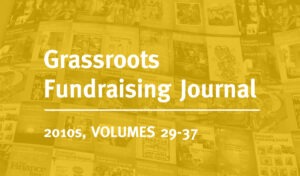
Editors’ note: This article, first published in print during Jul/Aug 2010, has been republished for Nonprofit Quarterly with minor updates.
Does This sound familiar?
You’re overwhelmed by the sheer volume of tasks in front of you—making sure your database can produce the information you need for your upcoming fundraising appeal, writing the appeal letter and producing a new remittance envelope, updating your website to reflect your current activities and make it easier for donors to give online, organizing your next major donor campaign, coordinating your annual dinner (which has its own mile-long task list).
You know you need help, and you’re not sure where to turn. Hiring additional staff to take on some of the fundraising tasks is beyond your budget.
Here are some other options:
- Hire someone on a contract basis to take on one fundraising project—for example, producing your annual special event, coordinating your major donor campaign, or dealing with the annual appeal
- Hire someone to provide training to give your fundraising team additional skills and confidence
- Hire someone to review and analyze your fundraising program and help you develop a better fundraising plan to accomplish any of these tasks—and, in fact, all of them— your best bet may be to hire a fundraising consultant. Whether you want someone to take on one of your big fundraising projects, expand the capacity of your team with training, or help you analyze and improve your fundraising planning, a consultant may be just the person you need.
Before deciding whether hiring a consultant is the route to take, it’s important to understand exactly what your needs are and what type of support will be most useful in getting you where you want to go. This article addresses key questions to consider when making the decision of whether to hire a fundraising consultant. It does not discuss the actual process of hiring a consultant. (For advice on choosing the right consultant, see Kim Klein’s Grassroots Fundraising Journal article, “Hiring a Fundraising Consultant,” available at grassroots Fundraising Journal article, “Hiring a Fundraising Consultant,” available at grassroots fundraising .org).
Key Questions
Do you have the capacity—among staff board members and volunteers—to implement your fundraising plan?
I recently conducted a fundraising training for a group of organizations working on domestic violence. I recognized the name of one of the organizations because someone from their group had attended one of my trainings about 10 years earlier, though the participant in this latest training was their relatively new development director. It was clear from the information that this participant shared over the course of the day that donor fundraising at this organization had not grown much since the last time I had seen them.
The development director talked about the problem of not enough time to do the individual donor work because of the pressures of what felt like never-ending foundation deadlines for letters of inquiry, proposals and reports. She said that even though the executive director, board members, and even some of the program staff were willing to help with fundraising, it was hard to carve out the time to plan and coordinate their efforts.
I realized that all the training and consulting in the world would not help this organization. What they needed was the commitment of resources (including staff time) to their individual donor program in a way that enabled them to be less random and more focused and consistent in this aspect of their fundraising.
A consultant can provide advice, guidance, and expertise to create fundraising plans, oversee a capital campaign, train the board and/or staff in asking for money, and help address problems that come out in the course of implementing a plan (among other things), but the actual day-to-day work of carrying out fundraising strategies and building relationships with donors has to be done by the staff board members and volunteers who make up your fundraising team.
Where a consultant can be helpful in such a situation is in addressing an organization’s inability to form a fundraising team or even to conceptualize what such a team would do and who might be on it.
Do you have staff capacity but need help with strategy, planning and coaching?
Although a fundraising consultant does not usually take work off your plate (with some exceptions, described below), they can fulfil a critical function in helping you to be more strategic, better organized, and more effective in developing a strong fundraising program. Here are some of the things a fundraising consultant can do:
- Conduct an assessment of your fundraising program’s strengths and challenges, and deliver a set of recommendations for how to improve your fundraising effectiveness
- Assist in the development of a fundraising plan
- Review fundraising materials, including fundraising appeals, case statements, annual reports, and so on
- Assist in the evaluation (and design) of your website, looking at it through the lens of a donor or other potential supporter for clear messages that make a compelling case for why someone should support the organization
- Provide fundraising training to board, staff and other members of the fundraising team on how to ask for money
- Help you find the best fundraising database for your organization
- Help plan and coordinate a capital campaign
- Provide ongoing support and coaching as you implement your fundraising or campaign plan
- Provide problem-solving assistance or the challenges you encounter in trying to build a strong individual donor program
- Coordinate one or more elements of your fundraising plan, such as member appeals, a special event, or a donor campaign Whether you hire a consultant to provide the most minimal advice and feedback or to work intensively to coordinate a major element of your fundraising plan, remember that you need to have the capacity on staff or among a group of very reliable volunteers to work closely with the consultant and to carry out many of the day-to-day activities. Many consulting relationships run aground because of unspoken (and then unmet) expectations about what a consultant can and can’t do, or because of confusion about the role of the consultant and the role of the staff and/or volunteer team.
For example, years ago, I was hired to help coordinate a major donor campaign. I did not realize until about three weeks into the contract that the board and staff expected me to ask my own colleagues and contacts for money. They were surprised at my refusal to do that until I said, “How would you feel if I contacted your board members and donors for money for another group that I was working with?” Although they understood what I meant, they were still disappointed and the relationship was damaged. Now I clarify the boundaries of the relationship early on.
Do you just need extra help on a specified fundraising activity?
Consultants can do the more hands-on work involved in certain types of fundraising projects. This is often the best choice if you have a very small development department (or if the “department” consists of one person who has additional responsibilities beyond fundraising) and the fundraising activity is labor-intensive over a limited period of time.
Sign up for our free newsletters
Subscribe to NPQ's newsletters to have our top stories delivered directly to your inbox.
By signing up, you agree to our privacy policy and terms of use, and to receive messages from NPQ and our partners.
Special events is a common area for such consultant involvement, as there are consultants who specialize in event production and who carry out activities such as finding a venue; dealing with all of the issues related to food, drink, stage managing, and working with the people who will be part of the program; helping create the program book; and designing and producing the invitation. Even when you hire someone in that capacity they should not be expected to solicit sponsors for the event, sell ads for your program book, or sell tickets. That will still be the responsibility of your staff board, and volunteers, who are the ones, after all, with the contacts and relationships with potential supporters for your group or cause.
Another useful opportunity to use consultants is to coordinate a time-limited individual donor campaign or an annual fundraising phone bank, or to assist volunteers in putting on a house party. In each of these situations, however, the consultant’s time is best spent on the campaign; producing materials to assist the team of solicitors; providing support, coaching, and training; and dealing with other logistical needs. The consultant should not be expected to host the house party, solicit donors, or come up with her or his own list of people to ask.
When a Consultant is Not Enough: The Case for Fundraising Staff
.
FUNDRAISING HAS BECOME an increasingly complex component of an organization’s work. As your fundraising activities grow, especially in the realm of individual donors, you will find that the need for dedicated fundraising staff will probably increase as well.
Many core principles about fundraising have remained the same over the years: the need for a strong and clear case for support; the importance of building relationships and seeing donors as more than the money they give; the importance of developing a systematic way of contacting, engaging, and soliciting donors; and the role of a team of people to carry out the work.
What has changed pretty dramatically in the last 20 years is the role of technology, from maintaining a high-quality website to using a database and working with four generations of donors who are very different in their giving habits—from some who don’t have computers to others who give only online and have never written a check. New technology has also introduced the ability—and therefore the need—to communicate quickly with your organization. There is much more to keep in mind, and decisions must be made quickly.
Because development work involves so many seemingly endless details, you need to have at least one person (and for larger organizations, more than one) who is paying attention to the whole picture: the infrastructure needs, keeping the fundraising team on track and on task, and developing and making materials available to the team.
Whether it makes more sense to hire a dedicated development staff person to play this role or reconfigure current staff responsibilities to divide the fundraising work across more people is a decision your group will have to make. There isn’t one perfect structure that we’re all waiting to discover, one “best” way to organize fundraising roles and responsibilities that works for all time and all organizations. At different times in an organization’s life, roles and structures change, depending on many factors, including the skill set of your current staff your ability to recruit a team of people to be involved, the kind of work your organization does and to whom it appeals, and the kinds of technology you need to implement certain types of fundraising projects.
What is absolutely true is that fundraising cannot be assigned to just one person. Even with a development department of one, there should always be other staff members involved as well as board members and other volunteers.
Does your fundraising team need new skills or motivation?
Even with experienced fundraising staff, a willing board, and a good fundraising plan, you may find that there is something else your fundraising team needs—an opportunity to learn new skills, understand how fundraising fits into the rest of the organization’s goals and strategies, and motivation to follow through on their fundraising commitments. Although training itself won’t fit all of the fundraising challenges you face, it can inspire, encourage, and give clearer direction to your fundraising team, as they gain the tools they need to get out and start asking for money.
Fundraising training can be one of the most helpful things a consultant can provide if the organization is ready to put the people who have been trained to work immediately. For example, I did a training for a fundraising team the day before it was about to launch a $75,000 annual fund campaign with calls to potential major donors. We practiced making the phone call, setting up the meeting, and asking for money. We reviewed how to know if someone is a true prospect, and we went over the process of asking and follow-up. When the team began their work the next day, the momentum and excitement of the training were still fresh.
Consultants are like anyone in any of the helping professions—they help you best when you and they are clear about what you need and what they can provide, and when you are willing to do the work required to make the project successful. Ultimately, the success of a consulting relationship is like that of any relationship: it works best when expectations are clear, questions are raised immediately, confusions are discussed and resolved thoroughly, and there is genuine respect between the consultant and the organization.
Stephanie Roth is a trainer and consultant with Klein and Roth Consulting (kleinandroth.com) and the former editor of the Grassroots Fundraising Journal.







